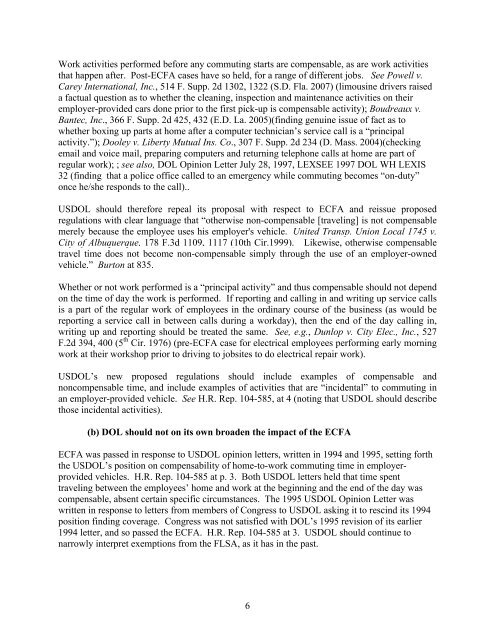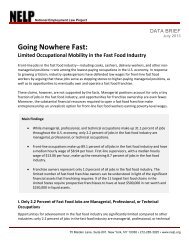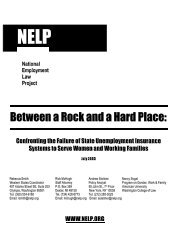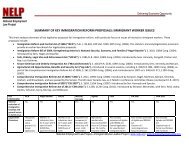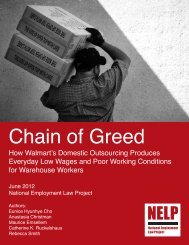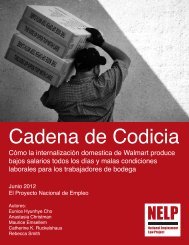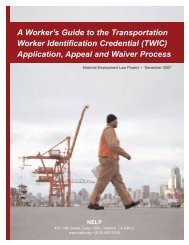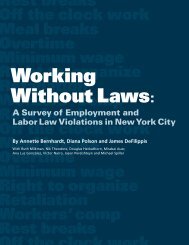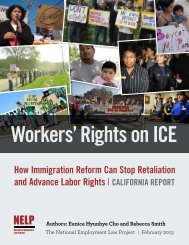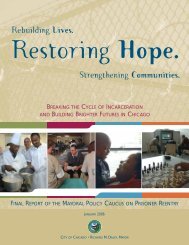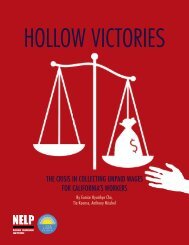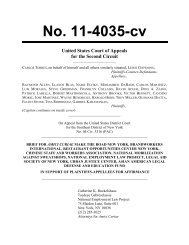National Employment Law Project
National Employment Law Project
National Employment Law Project
You also want an ePaper? Increase the reach of your titles
YUMPU automatically turns print PDFs into web optimized ePapers that Google loves.
Work activities performed before any commuting starts are compensable, as are work activities<br />
that happen after. Post-ECFA cases have so held, for a range of different jobs. See Powell v.<br />
Carey International, Inc., 514 F. Supp. 2d 1302, 1322 (S.D. Fla. 2007) (limousine drivers raised<br />
a factual question as to whether the cleaning, inspection and maintenance activities on their<br />
employer-provided cars done prior to the first pick-up is compensable activity); Boudreaux v.<br />
Bantec, Inc., 366 F. Supp. 2d 425, 432 (E.D. La. 2005)(finding genuine issue of fact as to<br />
whether boxing up parts at home after a computer technician’s service call is a “principal<br />
activity.”); Dooley v. Liberty Mutual Ins. Co., 307 F. Supp. 2d 234 (D. Mass. 2004)(checking<br />
email and voice mail, preparing computers and returning telephone calls at home are part of<br />
regular work); ; see also, DOL Opinion Letter July 28, 1997, LEXSEE 1997 DOL WH LEXIS<br />
32 (finding that a police office called to an emergency while commuting becomes “on-duty”<br />
once he/she responds to the call)..<br />
USDOL should therefore repeal its proposal with respect to ECFA and reissue proposed<br />
regulations with clear language that “otherwise non-compensable [traveling] is not compensable<br />
merely because the employee uses his employer's vehicle. United Transp. Union Local 1745 v.<br />
City of Albuquerque, 178 F.3d 1109, 1117 (10th Cir.1999). Likewise, otherwise compensable<br />
travel time does not become non-compensable simply through the use of an employer-owned<br />
vehicle.” Burton at 835.<br />
Whether or not work performed is a “principal activity” and thus compensable should not depend<br />
on the time of day the work is performed. If reporting and calling in and writing up service calls<br />
is a part of the regular work of employees in the ordinary course of the business (as would be<br />
reporting a service call in between calls during a workday), then the end of the day calling in,<br />
writing up and reporting should be treated the same. See, e.g., Dunlop v. City Elec., Inc., 527<br />
F.2d 394, 400 (5 th Cir. 1976) (pre-ECFA case for electrical employees performing early morning<br />
work at their workshop prior to driving to jobsites to do electrical repair work).<br />
USDOL’s new proposed regulations should include examples of compensable and<br />
noncompensable time, and include examples of activities that are “incidental” to commuting in<br />
an employer-provided vehicle. See H.R. Rep. 104-585, at 4 (noting that USDOL should describe<br />
those incidental activities).<br />
(b) DOL should not on its own broaden the impact of the ECFA<br />
ECFA was passed in response to USDOL opinion letters, written in 1994 and 1995, setting forth<br />
the USDOL’s position on compensability of home-to-work commuting time in employerprovided<br />
vehicles. H.R. Rep. 104-585 at p. 3. Both USDOL letters held that time spent<br />
traveling between the employees’ home and work at the beginning and the end of the day was<br />
compensable, absent certain specific circumstances. The 1995 USDOL Opinion Letter was<br />
written in response to letters from members of Congress to USDOL asking it to rescind its 1994<br />
position finding coverage. Congress was not satisfied with DOL’s 1995 revision of its earlier<br />
1994 letter, and so passed the ECFA. H.R. Rep. 104-585 at 3. USDOL should continue to<br />
narrowly interpret exemptions from the FLSA, as it has in the past.<br />
6


